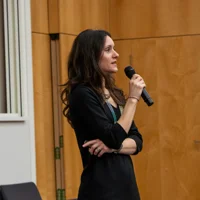Dr Laura M. Giurge

Dr Laura M. Giurge is Assistant Professor in Behavioural Science in the Department of Psychological and Behavioural Science.
What is your area of expertise and how did your interest for this area come about?
I have a PhD in Management and so my area of expertise is organisational behaviour or the study of human behaviour in organisations. My current research programme addresses the role of objective time (the passage of time based on the clock) and subjective time (the experience and perception of time) in three key domains: (1) inequality and bias, (2) creativity, and (3) the future of work.
Growing up in a developing country, I witnessed how thoughtful diversity initiatives often failed because of inequality, bias, or both. I was surprised that favouritism and discrimination were equally prevalent (yet sometimes less visible) in developed countries. These formative experiences inspired my research stream on inequality and bias, particularly around time and gender.
With a background in arts and a passion for creative work, I became interested in understanding the connection between time and creativity. Specifically, I currently explore how the way employees spend their time in and outside work shapes creative recognition and well-being.
My line of research on time and the future of work is motivated by the struggle to reconcile why well-intended transformations at work (e.g., work flexibility) fail to deliver on their promise to enhance employee well-being and productivity. Recognising that time used to be managed for us by clear organisational and societal structures, I examine the challenges and opportunities of new forms of structuring time as well as how perceptions of time shape individual and collective functioning.
Can you tell us about your career journey from your PhD to where you are now?
I often think of my career journey as a bit unusual for an academic path, at least it was at the time. Specifically, I earned my PhD in management within four years from Rotterdam School of Management and then did two postdoctoral research fellowships, one at Cornell University in the Management and Organization department, and one at London Business School in the Organisational Behaviour department. I’ve also spent some time as a visiting scholar at Harvard Business School, and as a visiting research fellow at the Wellbeing Research Centre at the University of Oxford.
Postdoctoral positions are unusual in management. And although the transition costs (e.g., moving across countries and continents, navigating new institutions) were challenging, my years as a postdoctoral research fellow allowed me to better solidify my research identity, acquire new skills, approach research from different perspectives, and build a global network of collaborators.
It was also during my postdoctoral research training that I began to care deeply about giving back to the academic community and beyond. For example, I’m currently co-organising three ongoing professional development workshops at the Academy of Management Annual Meeting (each with 100+ attendees): two focus on mentoring junior scholars on being successful in a postdoctoral position and in the publication process, whereas the other centres on developing the research agenda and community for the future of work.
Outside academia, I began translating my research to the public by publishing practitioner-oriented articles in outlets such as Harvard Business Review and the Wall Street Journal, thus ensuring that my research insights reach those who might benefit the most from applying them. Working directly with organisations is one of the most rewarding experiences for me as a scholar. The reason is two-fold. First, conducting research in organisations allows me to examine theoretically driven questions in a real-world context. Second, it means helping organisations address ongoing challenges in a rigorous way, thus potentially having a direct impact on employees’ lives.
At LSE, I continue to give back to the community. In fact, my commitment and dedication to provide developmental and timely feedback have been recognised by the Academy of Management Review (AMR) with an Outstanding Reviewer Award in 2023, and an Outstanding Developmental Reviewer Award in 2024, when I also joined AMR’s Editorial Review Board. I have also designed and currently lead a course on time at work for graduate and executive-level students, for which I received an Excellence in Teaching Award and several teaching award nominations from students.
What challenges and opportunities do you think AI will bring to your area of expertise? And to psychological and behavioural science more generally?
I think it is too soon to tell because we do not yet know what we would like to use AI for in academia. What we know so far from research is that AI is seen by some as a barrier and by others as an opportunity. Both experiences are valid and real, and they point at how emotions around AI are mostly absent from conversations about AI. To that end, Zoe Jonassen (Assistant Professor at the University of St Gallen) and I are writing a theory paper about this topic that discusses the role of emotions in human-AI collaboration.
What wider impact would you like your research to have on the world?
As a management scholar, I care about enhancing the lives of individuals within organisations and addressing critical social challenges. I am dedicated to uncovering novel theoretical issues that deepen our understanding of the workplace, and the practical challenges employees face in modern organisations. I hope to develop theory-grounded solutions to such challenges, helping to improve managerial practices and tackle contemporary issues, such as mitigating invisible inequalities and biases (e.g., related to time, mental health, and gender), enhancing and recognising hidden creative potential, and optimising the temporal structures of our (work)days.
If you'd like to learn more about Laura's work, visit her website and follow her on LinkedIn and Instagram.